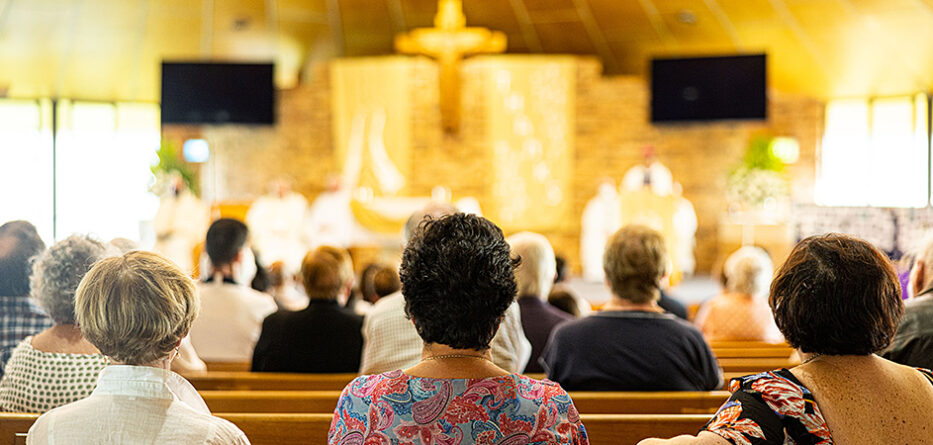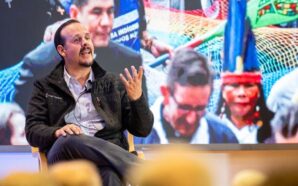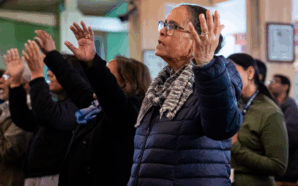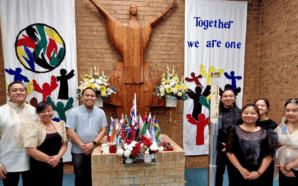Homily for the 23rd Sunday in Ordinary Time
Readings: Isaiah 35:4-7; Psalm 145(146):7-10; James 2:1-5; Mark 7:31-37
8 September 2024
In today’s gospel, Jesus makes the deaf hear. In the first reading from Isaiah, the prophet tells his listeners: “Courage! Do not be afraid.” “The ears of the deaf will be unsealed.” In the second reading, James tells the brothers: “Do not try to combine faith in Jesus Christ…with the making of distinctions between classes of people.” I came to reflect on these readings after participating in a webinar during the week with women calling out for ordination at least as deacons in our church. I am left wondering if we as Church are collectively deaf to their call, convinced that tradition dictates that we must maintain distinctions between classes of people in our Church, not on the basis of income and wealth which was the concern of James but on the basis of gender which is the issue of our time.
LISTEN: https://soundcloud.com/frank-brennan-6/homily-8924
Before I spoke on the webinar, one of my nieces said to me: “I hope you will have something positive to say for 50% of the population”.
Before I spoke, I asked the parish secretary for her views. She simply said: “We need some progress. Fr Peter (the third last parish priest) always promised it would happen in my lifetime. I’m still waiting.”
The day of the webinar happened to be the fifth anniversary of the death of my mother Patricia. At Mum’s funeral, my sister Anne, a doctor, said of Mum: “Although she worked as a doctor for three decades part time, her medical career was not the main game. She was the wind beneath my father’s wings and his career.”
When my mother was a young woman, it was unimaginable that a woman would be a deacon, a priest or a bishop in her Church, or a prime minister, a chief justice, or a governor-general in her society.
Her granddaughters have known each: a woman prime minister, a woman chief justice, and a woman governor-general – two of them! I daresay they wonder why not a woman deacon, priest or bishop in their Church.
Last weekend, Maxine McKew reminded me that at the 1974 joint sitting of the parliament after the double dissolution election during the Whitlam years, there was only one woman in the parliament.
It’s that which is now unimaginable. That which was traditional de rigueur is now what is unimaginable.
It’s over 60 years since Pope St John XXIII noted a characteristic of the modern age: “Women are gaining an increasing awareness of their natural dignity. Far from being content with a purely passive role or allowing themselves to be regarded as a kind of instrument, they are demanding both in domestic and in public life the rights and duties which belong to them as human persons.”[1] If in domestic and public life, why not in the life of the Church?
Addressing issues of exploitation and domination in his 1995 Letter to Women, Pope John Paul II said: “Transcending the established norms of his own culture, Jesus treated women with openness, respect, acceptance and tenderness. In this way he honoured the dignity which women have always possessed according to God’s plan and in his love”[2].
John Paul asked how much of this message had been heard and acted on. Can it be said in 21st-Century Australia that canon law and the Church norms for the treatment of women transcend the established norms of Australian culture? Or is it now the reverse? The norms of Australian culture transcend the Church’s treatment of women.
The fourth decree of our 2022 Plenary Council ‘Witnessing to the Equal Dignity of Women and Men’ attests: “God’s word speaks clearly of the equal dignity of women and men” and “Scripture calls the Church to recognise the equal dignity of women and men and to esteem their contributions.”
How can these solemn declarations of equality be made without amending canons 129 and 274 in the Code of Canon Law which basically reserve governance in the Church to clerics, reserving the clerical state to males?[3]
Pope Francis anxious to reserve priesthood only to men has been aware throughout his papacy of the internal tensions and contradictions this situation creates. In 2013, in his apostolic exhortation Evangelii Gaudium he said:
“The reservation of the priesthood to males, as a sign of Christ the Spouse who gives himself in the Eucharist, is not a question open to discussion, but it can prove especially divisive if sacramental power is too closely identified with power in general.” (#104)
And yet, that’s precisely what Canons 129 and 274 do – identifying sacramental power with power in general. In the forthcoming session of the Synod on Synodality, I presume we will see more of that tension playing out, with calls to sever the power of governance exclusively from ordination, opening offices which entail the power of ecclesiastical governance to all members of Christ’s faithful who were anointed at baptism with the same words, whether they be male or female:
“The God of power and Father of our Lord Jesus Christ…now anoints you with the chrism of salvation. As Christ was anointed Priest, Prophet, and King, so may you live always as a member of his body, sharing everlasting life.”
With the shortage of celibate males for ordination in the ministerial or hierarchical priesthood, why do we preclude competent and willing persons who share the one priesthood of Christ from the power of ecclesiastical governance? For how much longer will we be able to distinguish the common priesthood of all believers from the ministerial or hierarchical priesthood being reserved to celibate males?
After the first session of the Synod on Synodality in October 2023, the Synthesis Report made it clear that local churches were then to take up the issues raised, engaging in spiritual conversation and discernment, so that Synod participants could return to Rome this coming October. “Taking their starting point from the convergences already reached, (episcopal conferences were) called to focus on the questions and proposals that are considered most urgent.”[4]
Under each topic, the document set out convergences, matters for consideration and proposals. It described only four of these as urgent. One of those was: “ensuring that women can participate in decision-making processes and assume roles of responsibility in pastoral care and ministry”[5]. Cardinal McElroy from the USA, one of Pope Francis’ captain picks in that divided bishops’ conference, made the point that of the 81 proposals then voted on, “There’s only one that’s called urgent. And that is bringing women into greater roles of leadership at all levels of the Church. Not a single one has the word urgent or any equivalent word except for that one.”[6]
The section of last year’s Synthesis Report entitled ‘Women in the Life and Mission of the Church’ states:
”Different positions have been expressed regarding women’s access to the diaconal ministry. For some, this step would be unacceptable because they consider it a discontinuity with Tradition. For others, however, opening access for women to the diaconate would restore the practice of the Early Church. Others still, discern it as an appropriate and necessary response to the signs of the times, faithful to the Tradition, and one that would find an echo in the hearts of many who seek new energy and vitality in the Church. Some express concern that the request speaks of a worrying anthropological confusion, which, if granted, would marry the Church to the spirit of the age.”[7]
So we got the full spectrum of views there in the document published last October – from a full throated ‘YES’ to an adamant ‘NO’, not ever.
Then came the proposals including: “It is urgent to ensure that women can participate in decision-making processes and assume roles of responsibility in pastoral care and ministry.”[8]
Many of us have experienced fatigue and frustration with the synod process since Pope Francis’ interview on CBS television on 20 May 2024 when he said unequivocally that he was ruling out the possibility of ordaining women deacons. He was asked if women would ever have “the opportunity to be a deacon and participate as a clergy member in the Church”. Francis answered promptly and unambiguously, ‘No’. When pressed by the CBS reporter, he explained: “If it is deacons with Holy Orders, no. But women have always had, I would say, the function of deaconesses without being deacons, right? Women are of great service as women, not as ministers, as ministers in this regard, within the Holy Orders.”[9]
Here in Australia where women’s equal participation in all aspects of public life has accelerated rapidly this past generation, it is not surprising that young women, and young people generally, take exception to a Church where all offices are not open to men and women. As we continue to discern the action of the Spirit in our Church let’s take heart from the observation in the Instrumentum Laboris:
“Adopting a synodal style enables us to overcome the idea that all Churches must necessarily move at the same pace on every issue. On the contrary, differences in pace can be valued as an expression of legitimate diversity and an opportunity for the exchange of gifts and for mutual enrichment. In order to be realised, this horizon needs to be embodied in concrete structures and practices.”[10]
If only our bishops would be prepared to step out, ensuring that our treatment of women in the church at least keep pace with the established norms of our culture.
Here’s a little thought experiment. What say, in light of differing cultural norms about the place of women around the world, the universal law of the Church were to be modified to authorise national episcopal conferences to approve their bishops ordaining women deacons? Bear in mind that national and intra-national variation amongst dioceses was the only way the Anglican Church was able to proceed piecemeal to the ordination of women. Would our bishops then be prepared to act? Would the ACBC be prepared to authorise Australian bishops who wanted to ordain women as deacons? This might then mean, for example, that there would be women deacons in (say) Parramatta but not Hobart. Such an outcome would be consistent with Article 4 of the Fourth Decree of our Plenary Council which states: “That, should the universal law of the Church be modified to authorise the diaconate for women, the Plenary Council recommends that the Australian Bishops examine how best to implement it in the context of the Church in Australia.”
The founder of Australian Catholics Exploring the Diaconate (ACED) is a religious sister Elizabeth Young RSM working in the outback diocese of Wilcannia-Forbes. At the webinar she told us:
“Currently I minister as a parish life coordinator in the parish of Wilcannia, under the bishop as parish priest. He, or one of the other priests of the diocese, visit once a month for parish and school Mass. In this remote and predominantly Aboriginal community, I have been authorised to learn from the wisdom of the Aboriginal and remote dwellers, encourage the gifts of all the people of God, participate in anything going on, promote service and justice, administer the parish and celebrate the Sunday and other liturgies that help us in our spiritual journeys. Presiding at funerals and baptisms is an important part of my ministry, especially with the cultural value of sorry business, and the tradition of large family gatherings. What has emerged from my experience and questions about the special value of the ordained diaconal ministry is its ability to provide authorised liturgical and sacramental services to those in marginal situations or times in their lives.”[11]
Now is the time for the deaf to hear. Now is the time to take aways distinctions between classes of people in our Church. Now is the time to release the findings of the two commissions held by the pope to consider the question of women deacons. It’s time for us to stop going around in circles. It’s time for us to listen attentively to those women who are called to serve. Because now is the time that even 70-year-old male priests like me experience the exasperation of my niece and the resignation of my parish secretary.
As I contemplate the women like Elizabeth Young who spoke on the webinar during the week, I recall the promise of Isaiah in today’s first reading:
‘Then the eyes of the blind shall be opened,
the ears of the deaf unsealed,
then the lame shall leap like a deer
and the tongues of the dumb sing for joy.’
From the start of 2024, Fr Frank Brennan SJ is serving as part of a Jesuit team of priests working within a new configuration of the Toowong, St Lucia and Indooroopilly parishes in the Archdiocese of Brisbane. Frank Brennan SJ is a former CEO of Catholic Social Services Australia (CSSA). Fr Frank’s latest book is An Indigenous Voice to Parliament: Considering a Constitutional Bridge, Garratt Publishing, 2023 and his new book is ‘Lessons from Our Failure to Build a Constitutional Bridge in the 2023 Referendum’ (Connor Court, 2024).
[1] Pope John XXIII, Pacem in Terris #41
[2] Pope John Paul II, Letter to Women, 29 June 1995, #3
[3] Can. 129 §1. Those who have received sacred orders are qualified, according to the norm of the prescripts of the law, for the power of governance, which exists in the Church by divine institution and is also called the power of jurisdiction.
§2. Lay members of the Christian faithful can cooperate in the exercise of this same power according to the norm of law.
Can. 274 §1. Only clerics can obtain offices for whose exercise the power of orders or the power of ecclesiastical governance is required.
[4] XVI Ordinary General Assembly of the Synod of Bishops, First Session, A Synodal Church in Mission: Synthesis Report, p. 2.
[5] Ibid, p. 20
[6] See https://www.ncronline.org/vatican/vatican-news/exclusive-cardinals-cupich-mcelroy-say-impossible-go-back-synods-without-lay
[7] XVI Ordinary General Assembly of the Synod of Bishops, First Session, A Synodal Church in Mission: Synthesis Report, 20.
[8] Ibid.
[9] See https://cruxnow.com/vatican/2024/05/pope-francis-tells-cbs-news-women-cannot-receive-holy-orders-even-as-deacons
[10] Instrumentum Laboris #95
[11] See Elizabeth Young, ‘Women Deacons— A Perspective from Australia: A Response to Phyllis Zagano’, The Australasian Catholic Record 101/1 (2024): 20-23.







